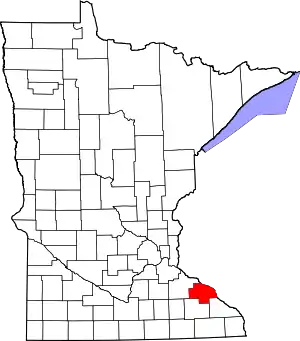Millville, Minnesota
Millville is a city along the Zumbro River in Wabasha County, Minnesota, United States. The population was 182 at the 2010 census.[6]
Millville | |
|---|---|
 Bridge over the Zumbro River in Millville | |
 Location of Millville, Minnesota | |
| Coordinates: 44°14′42″N 92°17′41″W | |
| Country | United States |
| State | Minnesota |
| County | Wabasha |
| Area | |
| • Total | 0.15 sq mi (0.40 km2) |
| • Land | 0.15 sq mi (0.39 km2) |
| • Water | 0.01 sq mi (0.01 km2) |
| Elevation | 830 ft (253 m) |
| Population | |
| • Total | 182 |
| • Estimate (2019)[3] | 178 |
| • Density | 1,186.67/sq mi (459.05/km2) |
| Time zone | UTC-6 (Central (CST)) |
| • Summer (DST) | UTC-5 (CDT) |
| ZIP code | 55957 |
| Area code(s) | 507 |
| FIPS code | 27-42290[4] |
| GNIS feature ID | 0647891[5] |
History
A post office called Millville has been in operation since 1867.[7] The city was located at a point where the Zumbro River makes a relatively rapid descent.[8]
The city contains one property listed on the National Register of Historic Places: the 1874 Swedish Evangelical Lutheran Church.[9]
Geography
According to the United States Census Bureau, the city has a total area of 0.14 square miles (0.36 km2), all of it land.[10]
Demographics
| Historical population | |||
|---|---|---|---|
| Census | Pop. | %± | |
| 1880 | 143 | — | |
| 1900 | 149 | — | |
| 1910 | 156 | 4.7% | |
| 1920 | 194 | 24.4% | |
| 1930 | 185 | −4.6% | |
| 1940 | 175 | −5.4% | |
| 1950 | 168 | −4.0% | |
| 1960 | 171 | 1.8% | |
| 1970 | 139 | −18.7% | |
| 1980 | 186 | 33.8% | |
| 1990 | 163 | −12.4% | |
| 2000 | 186 | 14.1% | |
| 2010 | 182 | −2.2% | |
| 2019 (est.) | 178 | [3] | −2.2% |
| U.S. Decennial Census[11] | |||
2010 census
As of the census[2] of 2010, there were 182 people, 75 households, and 54 families living in the city. The population density was 1,300.0 inhabitants per square mile (501.9/km2). There were 80 housing units at an average density of 571.4 per square mile (220.6/km2). The racial makeup of the city was 100.0% White. Hispanic or Latino of any race were 2.2% of the population.
There were 75 households, of which 25.3% had children under the age of 18 living with them, 57.3% were married couples living together, 9.3% had a female householder with no husband present, 5.3% had a male householder with no wife present, and 28.0% were non-families. 22.7% of all households were made up of individuals, and 13.3% had someone living alone who was 65 years of age or older. The average household size was 2.43 and the average family size was 2.78.
The median age in the city was 33.5 years. 23.6% of residents were under the age of 18; 12% were between the ages of 18 and 24; 24.7% were from 25 to 44; 23.6% were from 45 to 64; and 15.9% were 65 years of age or older. The gender makeup of the city was 51.1% male and 48.9% female.
2000 census
As of the census[4] of 2000, there were 186 people, 76 households, and 46 families living in the city. The population density was 1,279.8 people per square mile (478.8/km2). There were 78 housing units at an average density of 536.7 per square mile (200.8/km2). The racial makeup of the city was 93.01% White, 2.69% Native American, 4.30% from other races. Hispanic or Latino of any race were 4.84% of the population. There were 76 households, out of which 28.9% had children under the age of 18 living with them, 57.9% were married couples living together, 2.6% had a female householder with no husband present, and 38.2% were non-families. 32.9% of all households were made up of individuals, and 14.5% had someone living alone who was 65 years of age or older. The average household size was 2.45 and the average family size was 3.23.
In the city, the population was spread out, with 25.3% under the age of 18, 12.9% from 18 to 24, 28.5% from 25 to 44, 17.2% from 45 to 64, and 16.1% who were 65 years of age or older. The median age was 35 years. For every 100 females, there were 109.0 males. For every 100 females age 18 and over, there were 95.8 males.
The median income for a household in the city was $38,125, and the median income for a family was $52,750. Males had a median income of $28,571 versus $22,083 for females. The per capita income for the city was $16,491. None of the families and 4.4% of the population were living below the poverty line, including no under eighteens and 15.4% of those over 64.
References
- "2019 U.S. Gazetteer Files". United States Census Bureau. Retrieved July 26, 2020.
- "U.S. Census website". United States Census Bureau. Retrieved 2012-11-13.
- "Population and Housing Unit Estimates". United States Census Bureau. May 24, 2020. Retrieved May 27, 2020.
- "U.S. Census website". United States Census Bureau. Retrieved 2008-01-31.
- "US Board on Geographic Names". United States Geological Survey. 2007-10-25. Retrieved 2008-01-31.
- "2010 Census Redistricting Data (Public Law 94-171) Summary File". American FactFinder. United States Census Bureau. Retrieved 27 April 2011.
- "Wabasha County". Jim Forte Postal History. Retrieved 10 August 2015.
- Upham, Warren (1920). Minnesota Geographic Names: Their Origin and Historic Significance. Minnesota Historical Society. p. 557.
- "Minnesota National Register Properties Database". Minnesota Historical Society. 2009. Retrieved 2018-02-11.
- "US Gazetteer files 2010". United States Census Bureau. Archived from the original on 2012-01-25. Retrieved 2012-11-13.
- "Census of Population and Housing". Census.gov. Retrieved June 4, 2015.

